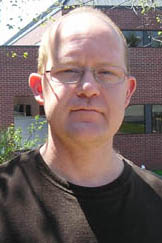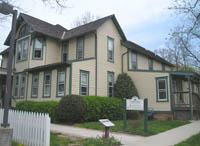 |
|
|
Politics
Main Page |
|
After Long Battle With Alcohol, Bethesda
Man Becomes Hopeful in Full-Time Rehabilitation Program
Maryland Newsline Monday, May 7, 2007 GAITHERSBURG, Md. - Standing at a little bit over 5 feet tall, 41-year-old David is affectionately referred to as “lil’ Dave” by childhood friends. His frequent smiles cause his eyes to squint. But it’s his outstretched hands, shaking uncontrollably, that reveal the history of his struggle in many ways. Decades of drinking caused so much nerve damage that even after some time away from alcohol, he still has the shakes, he said. At the tender age of 13, David snuck his first alcoholic drink while working as a bus boy at a Montgomery County restaurant, he said. Now, after about 27 years of blown pay checks, hospital visits and a period of homelessness, David is recovering from alcohol addiction at a treatment center. Alcohol might have robbed him of a lot of things, including his health, thousands of dollars and a potential wife. But after years of troubles, David, who asked that his last name not be used, is thankful to still be alive. Early Years As the youngest of six, with four brothers and one sister, in what David calls a strict but dysfunctional household in Bethesda, he was always eager to fit in, according to childhood friend Shawn McCord. McCord and David reunited many years later while both were in treatment for alcohol abuse. “His older brothers were crazy,” McCord said. “So Dave was always trying to keep up with them.” But David also had a strong work ethic that allowed him to obtain the bussing job at the now-closed restaurant, Michele’s, in Bethesda, while a 13-year-old junior high school student. At the age of 15, he started working in the kitchen of Michele’s, cooking and doing the dishes, he said. By the time he was 18 he was one of the head cooks, he said, cooking for parties with more than 200 guests. He ended up keeping the job until he was 21, dropping out of high school with just two months left until graduation. He did not see alcohol addiction as being a problem for him through most of his teenage years - despite the fact that he had begun supplementing it with marijuana. But his 19th year brought a change. He began to realize he was drinking excessively, he said. “By the age of 19, I got took over by alcohol,” he said. Passing Out, Again and Again The next two decades were filled with stints at food and automotive jobs, bar hopping, getting drunk, blacking out and hospital visits, David said. He had girlfriends, here and there, he said. But because of his alcoholism, he could never settle down. “I stayed in the bars until they closed,” he said. “After passing out the previous night, I would get up at 7 a.m. and continue to drink.” In his early 20s, he said he enjoyed drinking and had fun doing it. But by his mid-20s, his tolerance levels were getting shot -- his small frame heavily burdened by years of heavy drinking, he said.
“Everytime he drinks, he falls down and blacks out,” McCord said. And the frequent blackouts turned into frequent hospital visits, McCord said. “My friends worried about me a lot,” David said. David, too, was worried about his liver, he said, but the addiction had taken over. “I was too physically dependant on that drug,” he said. “I would quit for a couple of days, then I’d get drunk again.” Legal Trouble In February 1994, after a night of drinking, David crashed his Suzuki Samurai and broke his neck and shoulder, he said. He was charged with a DWI, Montgomery County District Court records show. After David pled guilty, a Montgomery County District Court judge in October 1996 sentenced him to 10 days in jail and 18 months of supervised probation. The judge also ordered him to submit to drug screening tests and attend Alcoholics Anonymous meetings. But David said he went right back to drinking. At that point he had been drinking for almost half of his life, and it was as routine as waking up to take a shower. As years went by, David was charged with a few minor alcohol-related offenses, including a 2002 offense for possessing an open container of alcohol. He was fined $45 for that the following year. During this period in his life, he managed to get jobs, hold them for a couple of months, then, after saving enough money, go on a 30- to 40-day alcohol binge, he said. Homeless in Frederick It was 2003, during a time he was commuting from his home in Bethesda to work in Frederick, when David suddenly found himself homeless. “I had a good place to live, I had a job, I had money, and because of my drinking -- BOOM” -- evicted, he said. Because he had spent his money on alcohol, David had problems keeping up with the rent, he said. “I went from 70-degree weather inside watching TV to out on the street with my head down on a piece of wood. There were times when I woke up face to face with a raccoon,” he said. His eyes moisten when describing his time on the streets in Frederick. “Whenever I see someone homeless on the side of the road, I really feel bad for them,” he said. While he was homeless, to keep up appearances at his job, he would go to the bathroom and wash up in the sink, and buy clothes from Goodwill. “I would always try to hide it. It was like a full-time job,” he said of the deceptions. He would get food from the grocery store, making sandwiches, then eating them in the store without paying, he said. While out on the street, he hardly ever slept because of the noisy traffic. “It scares me to death just thinking about it,” he said. “I’m scared to death to be homeless again.” While he was still homeless, and after a couple more failed rehab attempts, a stranger told him about the Wells/Robertson program. Recovery and Wells/Robertson
In Gaithersburg, across the parking lot from city hall, stands a nicely sized house with yellow siding and green trim, two porches, a small garden with a bench facing the house, and a well-manicured lawn. The house is the privately and publicly funded Wells/Robertson House, where 14 adults battling addiction live while participating in a highly structured two-year treatment program. Residents, all in recovery, are encouraged to interact and support each other in the small community, despite their differences. “Older residents learn from the younger residents and vice versa,” said Crystal Carr, human services director at Wells. The program focuses on topics ranging from credit repair to employment as well as recovering from an addiction, she said. It is at Wells where David remains sober; four months and counting. So far, he said, this is his longest time sober since he started drinking. “I needed to be in a long-term program,” he said. He credits Wells for saving him. “Without Wells, I don’t want to say I’d be dead. But I would probably be in jail or institutionalized.” He added, “I feel safe here.” McCord, also recovering from alcohol addiction at a halfway house in Montgomery County, said that he and David keep tabs on each other constantly. “He is new in recovery. It’s hard for him,” McCord said. David, however, constantly displays a positive attitude. Between his Alcoholics Anonymous meetings and volunteering at the Interfaith Clothing Ministry three days a week, he manages to keep himself busy – and away from alcohol. “I have to stay busy,” he said. “Idle hands are the devil’s workshop.” Copyright © 2007 University of Maryland Philip Merrill College of Journalism Banner graphic by Hortense Barber and Diego Mantilla. Banner photos of homeless person's cart and homeless man sitting are courtesy of Greg Sileo.
|


